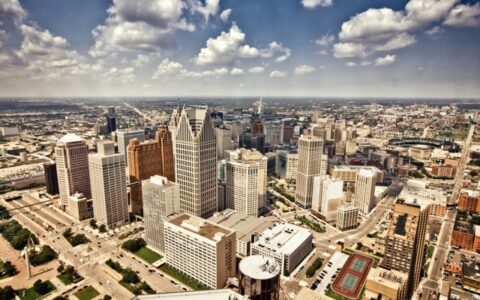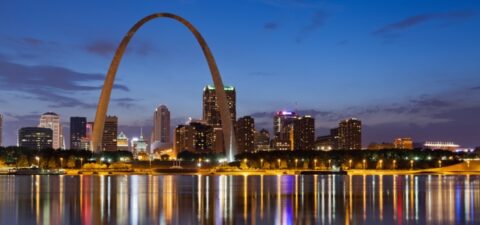Business & the Workforce

Michigan to Immigrants: You’re Welcome Here
It is clear that Michigan Gov. Rick Snyder understands that immigration can be a potent boost to his state’s economy. It’s also an important component of economic revitalization for a city such as Detroit. Improving the nation’s broken immigration system could have enormous economic benefits for Michigan and states across the country, so Snyder joined former New York City Mayor Michael Bloomberg and former Secretary of Commerce Carlos Gutierrez, in Washington Friday to continue urging lawmakers to overhaul the U.S. immigration system. As Gutierrez explained, “Our laws aren’t serving our economy.” And Bloomberg noted that it is terrible economic policy to turn away foreign born entrepreneurs and innovators while also making it difficult for foreign-born graduates to remain in the country after earning degrees from our colleges and universities. State leaders recognize this as well, but they also know upgrading immigration laws requires congressional action. “We need comprehensive immigration reform. Bottom line,” Snyder said Friday. “To be blunt, we have a dumb system.” Read More

16 Representatives Stuck in Reverse on Immigration
Despite the failure of the House to act on immigration reform last year, there was no doubt that the majority of Americans—and even the majority of Members of Congress—understood that immigration reform was an important component in creating economic opportunity for all. Last Friday, House Majority Leader Eric Cantor reiterated that support during an exchange on the House floor when he said Republicans were working on an “appropriate path forward” on immigration policies. “Immigration reform could be an economic boon to this country. We’ve got to do it right,” Cantor said. Read More

Immigrant Entrepreneurs are Investors in their Communities
Cedric Francois, a medical researcher from Belgium, came to Louisville, Kentucky, after hearing that researchers there were beginning work on the first hand transplant. Later, he co-founded two pharmaceutical companies. Suhas Kulkarni, an immigrant entrepreneur himself who founded Louisville-based IT firm Omnisys, understands the need for integrating and helping immigrant entrepreneurs get their start and is leading the area’s new Refugees and Immigrants Succeeding in Entrepreneurship (RISE) initiative. This is a collaborative effort among public and private organizations to support immigrants and refugees in the entrepreneurial endeavors in the Louisville area. RISE recognizes that Louisville “has an untapped pool of talent for city-wide economic development in the form of immigrants and refugees” and that “this population has the potential of becoming drivers of economic growth” for the region. Immigrant entrepreneurs are often vital assets in communities. They start businesses, create jobs, and encourage community revitalization efforts. Immigrant businesses can help revive dilapidated or aging retail corridors. And they provide an opportunity for immigrants to reinvest in the area. Take for example Vilmar Zenzen, originally from Brazil, who is opening a new upscale Brazilian steakhouse in downtown Louisville. Zenzen already operates another Brazilian steakhouse in Knoxville, Tennessee. Read More

Licensing Barriers Leave Immigrant Doctors Driving Cabs Instead of Practicing Medicine
Instead of putting foreign medical and other advanced degrees to use in the United States, it is common among immigrant doctors and other professionals to work less skilled jobs, such as a taxi driver or waiter, because the complicated licensing process keeps them from applying their training in the U.S. market. According to a recent Migration Policy Institute (MPI) series of reports on improving credential recognition, the United States is experiencing a “brain waste” by preventing immigrants living in the country from efficiently transferring their foreign credentials. MPI’s most recent report concludes their series by exploring prospects for international recognition of foreign qualifications. Read More

How Would Immigration Reform Help the U.S. Economy?
A growing consensus has emerged among both liberals and conservatives that immigration reform would serve as a stimulus to the U.S. economy. Reform would not only raise the wages—and therefore the tax payments and consumer purchasing power—of newly legalized immigrants, but would ensure future flows of immigrant workers, taxpayers, and consumers that are sufficient to meet the labor-force needs of our rapidly aging society. Conversely, trying to enforce our way out of a dysfunctional immigration system only wastes taxpayer dollars while exacting a high toll in both human lives and missed economic opportunities. Read More

From Coast to Coast, Immigrants Drive Local Economies
Immigrant entrepreneurship has transformed Atlanta’s northeastern suburbs along and near Buford Highway into “International Village” – an area filled with immigrant restaurants, markets, specialty stores, and other businesses. Through ventures such as Chinatown Square, Asian Square Mall, and Plaza Fiesta immigrants have “economically and socially revived an area that faced economic stagnation and population decline.” As one researcher noted, “the five-mile stretch of highway running through Chamblee, Doraville, and Norcross constitutes the greatest concentration of ethnic-owned businesses in the southeastern U.S.” Read More

College Leaders Know Immigration Reform Will Help Their Students and the Country
The U.S. has long been a destination for students around the world. They come to attend the nation’s colleges and universities, and many wish to stay to pursue job opportunities and make their lives here, but our immigration system throws up barriers at every step of the way. Foreign students add billions of dollars to the U.S. economy each year, and those who remain are more likely to start businesses and contribute to innovation than their American counterparts. Right now, as the economy struggles back to life, it’s hard to imagine letting such opportunities go to waste. Growing frustration with this dilemma is leading more and more college presidents, professors, and higher education administrators across the country to declare their support for improving the nation’s immigration policies. Read More

White House Honors Local Groups Leading the Way to Welcome Immigrants in Their Cities
Thousands of immigrants every day demonstrate a commitment to being part of America by becoming naturalized citizens every day. These Americans by choice often make huge sacrifices to move to the United State and become part of their community. But it also takes support from the local community to welcome new immigrants who want to establish roots in the area. Groups across the country are stepping up to fill that role and make their cities inviting to immigrants. Read More

Immigration is a Positive Force for Economic Growth in Cities
Posters on metro buses and trains in St. Louis will now welcome you to the city in 17 different languages, one of the many initiatives begun by the St. Louis Mosaic Project to create an atmosphere that welcomes and encourages immigrants to the area. Signs in the public transit system aren’t just designed to look pretty, however, but acknowledge that for many immigrants, particularly those new to the St. Louis region, this is their primary means of going to work or school, shopping, and taking part in all the community has to offer. “The Mosaic Project says a lot about where our region is going,” St. Louis County Executive Charlie Dooley said. “We want to be more diverse and see things from different points of view.” Read More

U.S. Must Confront Challenges of Attracting Global Innovation Talent
Across the United States, innovative industries in the science, technology, engineering, and mathematics (STEM) fields have driven economic growth and job creation nationally and in metropolitan areas throughout the country. And the human capital—the people who are leading these innovations—comes not only from homegrown talent but also from a global labor market and talent pool. The U.S. has a well-established innovation economy, similar to other developed nations. But certain challenges exist for countries to attract talent to fuel these industries. A new report from the Migration Policy Institute (MPI) describes the policy challenges related to attracting individuals from the global talent pool. The authors recognize human capital as “the one resource that can propel firms and economies to the top tier of competitiveness.” There have been undeniable increases in the supply and demand for skilled workers worldwide as more places continue to transition to knowledge-based economies with rising occupational skill requirements. As such, in addition to advances in OECD countries, the report notes that as developing countries continue to grow, and as their immigration policies “become less bureaucratic and cumbersome, a much greater choice of destinations will open up for the internationally mobile.” Read More
Make a contribution
Make a direct impact on the lives of immigrants.
